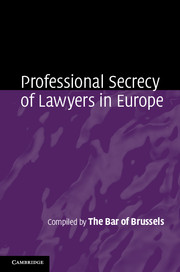Book contents
- Frontmatter
- Contents
- Contributors
- Preface
- 1 Professional secrecy in Europe
- 2 The CCBE rules on professional secrecy
- 3 Austria
- 4 Belgium
- 5 Bulgaria
- 6 Cyprus
- 7 Czech Republic
- 8 Denmark
- 9 Estonia
- 10 Finland
- 11 France
- 12 Germany
- 13 Greece
- 14 Hungary
- 15 Iceland
- 16 Ireland
- 17 Italy
- 18 Latvia
- 19 Liechtenstein
- 20 Lithuania
- 21 Luxembourg
- 22 Malta
- 23 The Netherlands
- 24 Norway
- 25 Poland
- 26 Portugal
- 27 Romania
- 28 Slovakia
- 29 Slovenia
- 30 Spain
- 31 Sweden
- 32 Switzerland
- 33 United Kingdom
- Index
- References
19 - Liechtenstein
Published online by Cambridge University Press: 05 June 2013
- Frontmatter
- Contents
- Contributors
- Preface
- 1 Professional secrecy in Europe
- 2 The CCBE rules on professional secrecy
- 3 Austria
- 4 Belgium
- 5 Bulgaria
- 6 Cyprus
- 7 Czech Republic
- 8 Denmark
- 9 Estonia
- 10 Finland
- 11 France
- 12 Germany
- 13 Greece
- 14 Hungary
- 15 Iceland
- 16 Ireland
- 17 Italy
- 18 Latvia
- 19 Liechtenstein
- 20 Lithuania
- 21 Luxembourg
- 22 Malta
- 23 The Netherlands
- 24 Norway
- 25 Poland
- 26 Portugal
- 27 Romania
- 28 Slovakia
- 29 Slovenia
- 30 Spain
- 31 Sweden
- 32 Switzerland
- 33 United Kingdom
- Index
- References
Summary
Scope of and limitations on professional secrecy
Legal professional privilege and the confidentiality between client and attorney represent one of the most important ‘privileges’ of the attorney. Other privileges, or more specifically the essential requirements for the diligent practice of the legal profession, include the independence of the attorney and the free choice of brief.
Statutory basis and implications
The legal basis is spread between various laws and directives. A major provision appears in the Liechtenstein Act on Attorneys-at-Law (RAG) in Article 15. This is worded as follows:
The attorney has an obligation of secrecy in respect of matters he or she has been entrusted with and other matters that have become known to him in his professional capacity, and whose secrecy is in the best interests of his client. He is entitled to claim legal professional privilege in legal and other official proceedings in accordance with the procedural provisions.
The right of the attorney to maintain secrecy may not be circumvented by legal or other official measures, in particular by interrogation of the attorney’s assistants or by imposing the delivery of written documents, pictures, recorded speech or data carriers (documents) or their confiscation; specific rules on the scope of this interdiction remain unaffected.
Other provisions appear in the relevant procedural laws, namely the Code of Criminal Procedure (StPO) and the Code of Civil Procedure (ZPO). These provisions are very similar in wording to Austrian legislation. This is also the case in other laws. In its legislation Liechtenstein is very willing to borrow, meaning that it will look to see what legal solutions exist – normally in the case of its neighbours, Switzerland and Austria – and then adopt them with minimal variation. It may be noted that there is a tendency for procedural laws from Austria to be adopted.
- Type
- Chapter
- Information
- Professional Secrecy of Lawyers in Europe , pp. 310 - 319Publisher: Cambridge University PressPrint publication year: 2013

